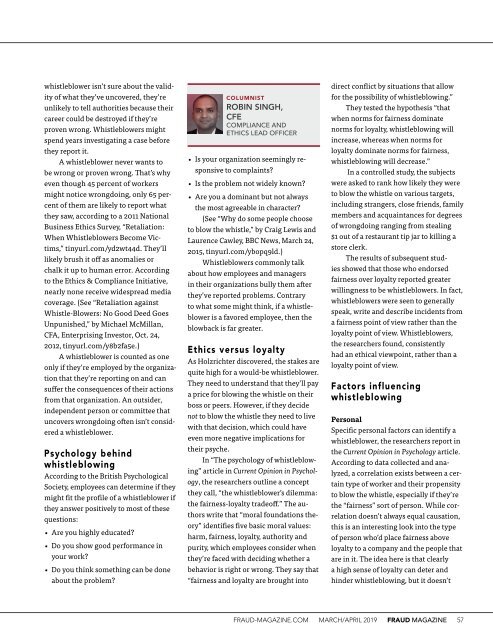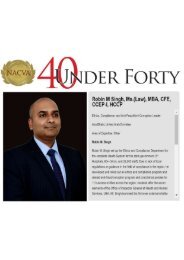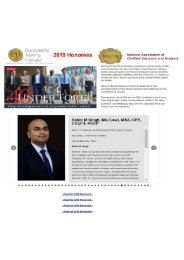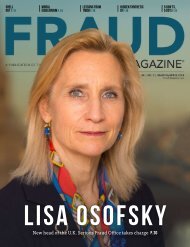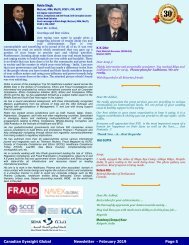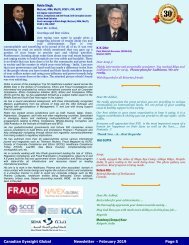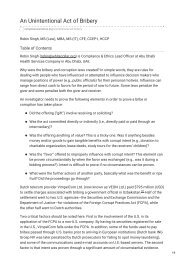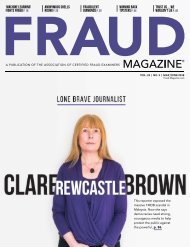Why do employees blow the #whistle? by #Robin #Singh (Published by #ACFE)
Read about what goes through the mind of a #whistleblower by Robin Singh. What are their thought process, sufferings, and internal dilemmas when they blow the whistle. According to the author, it is a true fight for #integrity and #ethics and intolerance towards #fraud, #misconduct, #non-compliance. Furthermore, most of the #whistleblowers are not a #compliance #Officer or a #fraud #Investigator or a #regulator, rather a common person on the ground who ensure the ecological balance between existence of a company versus practices adopted to reach a higher share price.
Read about what goes through the mind of a #whistleblower by Robin Singh. What are their thought process, sufferings, and internal dilemmas when they blow the whistle.
According to the author, it is a true fight for #integrity and #ethics and intolerance towards #fraud, #misconduct, #non-compliance. Furthermore, most of the #whistleblowers are not a #compliance #Officer or a #fraud #Investigator or a #regulator, rather a common person on the ground who ensure the ecological balance between existence of a company versus practices adopted to reach a higher share price.
Create successful ePaper yourself
Turn your PDF publications into a flip-book with our unique Google optimized e-Paper software.
whistle<strong>blow</strong>er isn’t sure about <strong>the</strong> validity<br />
of what <strong>the</strong>y’ve uncovered, <strong>the</strong>y’re<br />
unlikely to tell authorities because <strong>the</strong>ir<br />
career could be destroyed if <strong>the</strong>y’re<br />
proven wrong. Whistle<strong>blow</strong>ers might<br />
spend years investigating a case before<br />
<strong>the</strong>y report it.<br />
A whistle<strong>blow</strong>er never wants to<br />
be wrong or proven wrong. That’s why<br />
even though 45 percent of workers<br />
might notice wrong<strong>do</strong>ing, only 65 percent<br />
of <strong>the</strong>m are likely to report what<br />
<strong>the</strong>y saw, according to a 2011 National<br />
Business Ethics Survey, “Retaliation:<br />
When Whistle<strong>blow</strong>ers Become Victims,”<br />
tinyurl.com/yd2wt44d. They’ll<br />
likely brush it off as anomalies or<br />
chalk it up to human error. According<br />
to <strong>the</strong> Ethics & Compliance Initiative,<br />
nearly none receive widespread media<br />
coverage. (See “Retaliation against<br />
Whistle-Blowers: No Good Deed Goes<br />
Unpunished,” <strong>by</strong> Michael McMillan,<br />
CFA, Enterprising Investor, Oct. 24,<br />
2012, tinyurl.com/y8b2fa5e.)<br />
A whistle<strong>blow</strong>er is counted as one<br />
only if <strong>the</strong>y’re employed <strong>by</strong> <strong>the</strong> organization<br />
that <strong>the</strong>y’re reporting on and can<br />
suffer <strong>the</strong> consequences of <strong>the</strong>ir actions<br />
from that organization. An outsider,<br />
independent person or committee that<br />
uncovers wrong<strong>do</strong>ing often isn’t considered<br />
a whistle<strong>blow</strong>er.<br />
Psychology behind<br />
whistle<strong>blow</strong>ing<br />
According to <strong>the</strong> British Psychological<br />
Society, <strong>employees</strong> can determine if <strong>the</strong>y<br />
might fit <strong>the</strong> profile of a whistle<strong>blow</strong>er if<br />
<strong>the</strong>y answer positively to most of <strong>the</strong>se<br />
questions:<br />
• Are you highly educated?<br />
• Do you show good performance in<br />
your work?<br />
• Do you think something can be <strong>do</strong>ne<br />
about <strong>the</strong> problem?<br />
• Is your organization seemingly responsive<br />
to complaints?<br />
• Is <strong>the</strong> problem not widely known?<br />
• Are you a <strong>do</strong>minant but not always<br />
<strong>the</strong> most agreeable in character?<br />
(See “<strong>Why</strong> <strong>do</strong> some people choose<br />
to <strong>blow</strong> <strong>the</strong> whistle,” <strong>by</strong> Craig Lewis and<br />
Laurence Cawley, BBC News, March 24,<br />
2015, tinyurl.com/ybopq9ld.)<br />
Whistle<strong>blow</strong>ers commonly talk<br />
about how <strong>employees</strong> and managers<br />
in <strong>the</strong>ir organizations bully <strong>the</strong>m after<br />
<strong>the</strong>y’ve reported problems. Contrary<br />
to what some might think, if a whistle<strong>blow</strong>er<br />
is a favored employee, <strong>the</strong>n <strong>the</strong><br />
<strong>blow</strong>back is far greater.<br />
Ethics versus loyalty<br />
As Holzrichter discovered, <strong>the</strong> stakes are<br />
quite high for a would-be whistle<strong>blow</strong>er.<br />
They need to understand that <strong>the</strong>y’ll pay<br />
a price for <strong>blow</strong>ing <strong>the</strong> whistle on <strong>the</strong>ir<br />
boss or peers. However, if <strong>the</strong>y decide<br />
not to <strong>blow</strong> <strong>the</strong> whistle <strong>the</strong>y need to live<br />
with that decision, which could have<br />
even more negative implications for<br />
<strong>the</strong>ir psyche.<br />
COLUMNIST<br />
CFE<br />
COMPLIANCE AND<br />
ETHICS LEAD OFFICER<br />
In “The psychology of whistle<strong>blow</strong>ing”<br />
article in Current Opinion in Psychology,<br />
<strong>the</strong> researchers outline a concept<br />
<strong>the</strong>y call, “<strong>the</strong> whistle<strong>blow</strong>er’s dilemma:<br />
<strong>the</strong> fairness-loyalty tradeoff.” The authors<br />
write that “moral foundations <strong>the</strong>ory”<br />
identifies five basic moral values:<br />
harm, fairness, loyalty, authority and<br />
purity, which <strong>employees</strong> consider when<br />
<strong>the</strong>y’re faced with deciding whe<strong>the</strong>r a<br />
behavior is right or wrong. They say that<br />
“fairness and loyalty are brought into<br />
direct conflict <strong>by</strong> situations that allow<br />
for <strong>the</strong> possibility of whistle<strong>blow</strong>ing.”<br />
They tested <strong>the</strong> hypo<strong>the</strong>sis “that<br />
when norms for fairness <strong>do</strong>minate<br />
norms for loyalty, whistle<strong>blow</strong>ing will<br />
increase, whereas when norms for<br />
loyalty <strong>do</strong>minate norms for fairness,<br />
whistle<strong>blow</strong>ing will decrease.”<br />
In a controlled study, <strong>the</strong> subjects<br />
were asked to rank how likely <strong>the</strong>y were<br />
to <strong>blow</strong> <strong>the</strong> whistle on various targets,<br />
including strangers, close friends, family<br />
members and acquaintances for degrees<br />
of wrong<strong>do</strong>ing ranging from stealing<br />
$1 out of a restaurant tip jar to killing a<br />
store clerk.<br />
The results of subsequent studies<br />
showed that those who en<strong>do</strong>rsed<br />
fairness over loyalty reported greater<br />
willingness to be whistle<strong>blow</strong>ers. In fact,<br />
whistle<strong>blow</strong>ers were seen to generally<br />
speak, write and describe incidents from<br />
a fairness point of view ra<strong>the</strong>r than <strong>the</strong><br />
loyalty point of view. Whistle<strong>blow</strong>ers,<br />
<strong>the</strong> researchers found, consistently<br />
had an ethical viewpoint, ra<strong>the</strong>r than a<br />
loyalty point of view.<br />
Factors influencing<br />
whistle<strong>blow</strong>ing<br />
Personal<br />
Specific personal factors can identify a<br />
whistle<strong>blow</strong>er, <strong>the</strong> researchers report in<br />
<strong>the</strong> Current Opinion in Psychology article.<br />
According to data collected and analyzed,<br />
a correlation exists between a certain<br />
type of worker and <strong>the</strong>ir propensity<br />
to <strong>blow</strong> <strong>the</strong> whistle, especially if <strong>the</strong>y’re<br />
<strong>the</strong> “fairness” sort of person. While correlation<br />
<strong>do</strong>esn’t always equal causation,<br />
this is an interesting look into <strong>the</strong> type<br />
of person who’d place fairness above<br />
loyalty to a company and <strong>the</strong> people that<br />
are in it. The idea here is that clearly<br />
a high sense of loyalty can deter and<br />
hinder whistle<strong>blow</strong>ing, but it <strong>do</strong>esn’t<br />
FRAUD-MAGAZINE.COM MARCH/APRIL 2019 FRAUD MAGAZINE 57


